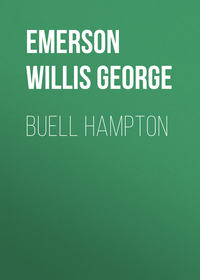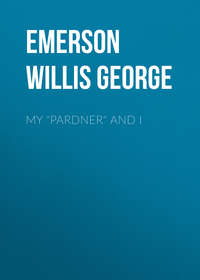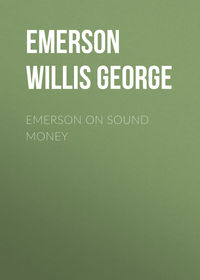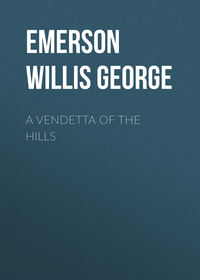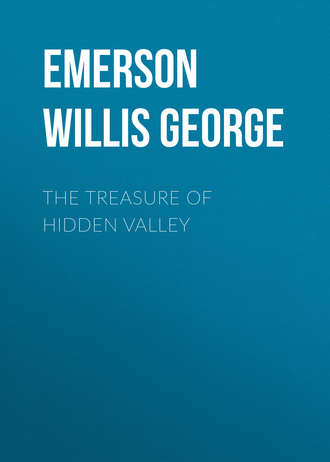 полная версия
полная версияThe Treasure of Hidden Valley
“‘She knows I would like him,’”he muttered, as he gained the race track, the scene of his recent triumphs, its turf torn and dented with the hoofs of struggling steers and horses, thronged but an hour before with a wildly excited multitude but now silent and void. “‘Like him’.” he reiterated bitterly. “Yes – like hell.”
And with the words he set his steed at the farther rail. Badger skimmed over it like a deer and Roderick galloped on across country, making for the hills.
That night he did not return to the bunk house.
It was high noon next day when he showed up at the ranch. He went straight to Mr. Shields’ office, gave in his resignation, and took his pay check. No explanations were required – Mr. Shields had known for a considerable time that Roderick was leaving. He thanked him cordially for his past services, congratulated him on his championship honors at the frontier celebration, and bade him come to the ranch home at any time as a welcome guest. Roderick excused himself from saying good-by for the present to the ladies; he was going to stay for a while in Encampment with his friend Grant Jones, and would ride out for an evening visit before very long. Then he packed his belongings at the bunk house, left word with one of the helpers for trunk and valise to be carted into town, and rode away. Badger was Roderick’s own personal property; he had purchased the pony some months before from Mr. Shields, and as he leaped on its back after closing the last boundary gate he patted the animal’s neck fondly and proudly. Badger alone was well worth many months of hard and oftentimes distasteful work, a horse at all events could be faithful, he and his good little pony would never part – such was the burden of his thoughts as he left the Shields ranch and the cowboy life behind him.
Grant Jones was in Encampment, and jumped up from his writing table when Roderick threw open the door of the shack and walked in.
“Hello, old man, this is indeed a welcome visit. Where in the wide world have you been?”
He turned Roderick around so the light would fall upon his face as he extended his hand in warmest welcome, and noticed he was haggard and pale.
“Oh,” said Roderick, “I have been up in the hills fighting it out alone, sleeping under the stars and thinking matters over.”
“What does this all mean, anyway, old man? I don’t understand you,” said Grant with much solicitude.
“Well, guess you better forget it then,” said Roderick half abruptly. “But I owe you an apology for going away so unceremoniously from the frontier gathering. I know we had arranged to dine together last night But I just cleared out – that’s all. Please do not ask me any questions, Grant, as to why and wherefore. If in the future I should take you into my confidence that will be time enough.”
“All right, old man,” said Grant, “here is my hand. And know now and for all time it don’t make a derned bit of difference what has happened, I am on your side to the finish, whether it is a desperate case of petty larceny or only plain murder.”
Grant laughed and tried to rouse his friend into hilarity.
“It is neither,” replied Roderick laconically. “All the same I’ve got some news for you. I have quit my job.”
“At the Shields ranch?” cried Grant in astonishment. “Surely there’s been no trouble there?”
“Oh, no, we are all the best of friends. I am just tired of cow-punching, and have other plans in view. Besides, remember the letter we got pushed under the door here on the occasion of my last visit. Perhaps I may be a bit skeered about having my hide shot full of holes, eh, old man?” Roderick was now laughing.
But Grant looked grave. He eyed his comrade tentatively.
“Stuff and nonsense. The lunatic who wrote that letter was barking up the wrong tree. He mistook you for the other fellow. You were never seriously smitten in that quarter, now were you, Rod, old man?”
“Certainly not. Barbara Shields is a fine girl, but I never even dreamed of making love to her. I didn’t come to Wyoming to chase after a millionaire’s daughter,” he added bitterly.
“Oh, that’s Barbara’s misfortune not her fault,” laughed Grant. “But I was afraid you had fallen in love with her, just as I fell head over heels in love with Dorothy – for her own sake, dear boy, and not for anything that may ever come to her from her father.”
“You were afraid, do you say?” quizzed Roderick. “Have you Mormonistic tendencies then? Do you grudge a twin to the man you always call your best friend?”
“Oh, you know there’s no thought like that in my mind,” protested Grant. “But you came on to the field too late. You see Ben Bragdon was already almost half engaged.”
“So that’s the other fellow, is it?” laughed Roderick. “Oh, now I begin to understand. Then things have come to a crisis between Barbara and Bragdon.”
“Well, this is in strict confidence, Rod. But it is true. That’s why I was a bit nervous just now on your account – I kind of felt I had to break bad news.”
“Oh, don’t you worry on my account. Understand once and for all that I’m not a marrying man.”
“Well, we’ll see about that later on,” replied Grant, smiling. “But I should have been real glad had you been the man to win Barbara Shields. How jolly happy we would have been, all four together.”
“Things are best just as they are,” said Roderick sternly. “I wouldn’t exchange Badger, my horse out there, for any woman in the world. Which reminds me, Grant, that I’ve come here to stay with you for a while. Guess I can put Badger in the barn.”
“Sure – you are always welcome; I don’t have to say that. But remember that Barbara-Bragdon matter is a dead secret. Dorothy just whispered it to me in strictest confidence. Hard lines that, for the editor of such an enterprising newspaper as the Dillon Doublejack. But the engagement is not to be announced until the Republican nomination for state senator is put through. You know, of course, that Ben Bragdon has consented to run against Carlisle and the smelter interests.”
“I’m glad to hear it And now we have an additional reason to put our shoulders to the wheel. We’ve got to send Ben Bragdon to Cheyenne for Barbara’s sake. Count me in politics from this day on, old man. You see I am out of a job. This will be something worth while – to help down that blood-sucker Grady, and at the same time secure Bragdon’s election.”
“Ben Bragdon is the best man for Wyoming.”
“I know it. Put me on his committee right away.”
“You’ll be a tower of strength,” exclaimed Grant enthusiastically. “The champion broncho-buster of the world – just think of that.”
Roderick laughed loud and long. This special qualification for political work mightily amused him.
“Oh, don’t laugh,” Grant remonstrated, in all seriousness. “You are a man of note now in the community, make no mistake. You can swing the vote of every cow-puncher in the land. You are their hero – their local Teddy Roosevelt.”
Again Roderick was convulsed.
“And by the way,” continued Grant, “I never had the chance to congratulate you on that magnificent piece of work on Gin Fizz. It was the greatest ever.”
“Oh, we’ll let all that slide.”
“No, siree. Wait till you read my column description of the immortal combat in the Doublejack.” He turned to his writing desk, and picked up a kodak print. “Here’s your photograph – snapped by Gail Holden on the morning of the event, riding your favorite pony Badger. Oh, I’ve got all the details; the half-tone has already been made. The Encampment Herald boys have been chasing around all day for a picture, but I’m glad you were in hiding. The Doublejack will scoop them proper this time.”
But Roderick was no longer listening. The name of Gail Holden had sent his thoughts far away.
“How’s Scotty Meisch?” he asked – rather inconsequentially as the enthusiastic editor thought.
“Oh, Scotty Meisch? He’s all right. Slight concussion of the brain – will be out of the hospital in about two weeks. But Miss Holden, as it turned out, did the lad a mighty good turn in rushing him to the hospital He was unconscious when they got there. She knew more than Doc Burke – or saw more; or else the Doc could not deny himself the excitement of seeing you tackle Gin Fizz. But there’s no selfishness in Grail Holden’s make-up – not one little streak.”
In a flash Roderick Warfield saw everything under a new light, and a great glow of happiness stole into his heart. It was not indifference for him that had made Gail Holden miss the outlaw contest. What a fool he had been to get such a notion into his head.
“Guess I’ll go and feed Badger,” he said, as he turned away abruptly and left the room.
“When you come back I’ve a lot more to talk about,” shouted Grant, resuming his seat and making a grab for his lead-pencil.
But it was several hours before Roderick returned. He had baited the pony, watched him feed, and just drowsed away the afternoon among the fragrant bales of hay – drowsing without sleeping, chewing a straw and thinking all the time.
At last he strolled in upon the still busy scribe. Grant threw down his pencil.
“Thought you had slipped away again to the hills and the starlight and all that sort of thing. I’m as hungry as a hunter. Let’s go down town and eat.”
“I’m with you,” assented Roderick. “But after dinner I want to see Major Buell Hampton. Is he likely to be at home?”
“It was about Buell Hampton I was going to speak to you. Oh, you don’t know the news.” Grant was hopping around in great excitement, changing his jacket, whisking the new coat vigorously. “But there, I am pledged again to secrecy – Good God, what a life for a newspaper man to lead, bottled up all the time!”
“Then when am I to be enlightened?”
“He sent for me this morning and I spent an hour with him. He also wanted you, but you were not to be found. He wants to see you immediately. Tonight will be the very time, for he said he would be at home.”
“That’s all right, Grant. But, say, old fellow, I want half an hour first with the Major – all alone.”
“Mystery after mystery,” fairly shouted the distracted editor. “Can’t you give me at least this last news item for publication? I’m losing scoops all the time.”
“I’m afraid you must go scoopless once again,” grinned Roderick. “But after dinner you can do a little news-hunting on your own account around the saloons, then join me later on at the Major’s. That suit you?”
“Oh, I suppose I’ve got to submit,” replied Grant, as he drew on his now well-brushed coat. “But all through dinner, I’ll have you guessing, old man. You cannot imagine the story Buell Hampton’s going to tell you. Oh, you needn’t question me. I’m ironclad – bomb-proof – as silent as a clam.”
Roderick laughed at the mixed metaphors, and arm in arm the friends started for their favorite restaurant.
CHAPTER XX – THE STORE OF GOLD
A COUPLE of hours later Roderick arrived at Buell Hampton’s home. The Major was alone; there were no signs of Jim Rankin or Tom Sun; no traces of the recent midnight toil. The room looked just the same as on the occasion of Roderick’s last visit, now more than two months ago, except for a curtain hanging across one wall.
Buell Hampton was seated before the great fireplace and notwithstanding the season of the year had a small bed of coals burning.
“It takes the chill away, for one thing,” he explained after greeting his visitor, “and then it gives me the inspiration of real live embers into which to look and dream. There are so many poor people in the world, so much suffering and so many heartaches, that one hardly knows where to begin.”
“Well, Major,” said Roderick, “I am glad to find you in this mood. I’m one of the sufferers – or at least have been. I have come to you for some heartache balm. Oh, I’m not jesting. Really I came here tonight determined to give you my confidence – to ask your advice as to my future plans.”
“I am extremely glad you feel toward me like that, my lad,” exclaimed Buell Hampton, grasping Roderick’s arm and looking kindly into his eyes. “I have always felt some subtle bond of sympathy between us. I have wanted to help you at the outset of a promising career in every way I can. I count it a privilege to be called in to comfort or to counsel, and you will know later that I have something more for you than mere words of advice.”
“Well, it is your advice I want most badly now, Major. In the first place I have thrown up my job with Mr. Shields.”
“Tired of cow-punching?” nodded Buell Hampton with a smile. “I knew that was coming.”
“In the second place I want to be perfectly candid with you. I have a prospecting venture in view.”
“That I have guessed from several hints you have dropped from time to time.”
“Well, you spoke a while ago about your reserving some little interest for me in your great gold discovery. That was mighty kind, and rest assured I appreciate your goodness to one who only a few months ago was a stranger to you.”
“You forget that I am a reader of character – that no kindred souls are strangers even at a first meeting, my son.”
Buell Hampton spoke very softly but very clearly; his gaze rested fixedly on Roderick; the latter felt a thrill run through him – yes, assuredly, this great and good man had been his friend from the first moment they had clasped hands.
“You were very good then, Major,” he replied, “in judging me so kindly. But I am afraid that I evoked your special sympathy and interest because of the confidences I gave you at one of our early meetings. You will not have forgotten how I spoke in a most sacred way about certain matters in Galesburg and what I intended to do when I had sufficient money to carry out my plans.”
“I remember distinctly,” said the Major. “Your frank confidence greatly pleased me. Well, has anything happened?”
“There is just one man on earth I will show this letter to, and you, Major, are the man.”
Saying this Roderick handed over Stella Rain’s letter.
After the Major had carefully perused it and put it back in the envelope, he reached across to Roderick.
“No,” said Roderick, “don’t give that letter back to me. Kindly lay it on the red coals and let me see it burn to gray ashes. I have fought this thing out all alone up in the hills, and I am now almost glad that letter came, since it had to be. But let it vanish now in the flames, just as I am going to put Stella Rain forever out of my thoughts. Yesterday the receipt of this letter was an event; but from now on I shall endeavor to regard it as only an incident.”
Silently and musingly the Major complied with Roderick’s request and consigned the letter to the glowing embers. When the last trace had disappeared, he looked up at Roderick.
“I will take one exception to your remarks,” he said. “Do not think unkindly of Stella Rain, nor even attempt to put her out of your thoughts. Her influence over you has been all for good during the past months, and she has shown herself a very fine and noble woman in the gentle manner in which she has broken the bonds that had tied you – bonds impulsively and all too lightly assumed on your part, as she knew quite well from the beginning. I have a profound admiration for your little ‘college widow,’ Roderick, and hold her in high esteem.”
There was just the suspicion of tears in Roderick’s eyes – a lump in his throat which rendered it impossible for him to reply. Yes; all bitterness, all sense of humiliation, were now gone. He too was thinking mighty kindly of sweet and gentle Stella Rain.
“Remember,” continued the Major quietly, “you told me how she warned you that some other day another girl, the real girl, would come along. I guess that has happened now.”
Roderick started; there was a protesting flush upon his cheek.
“Even though you may not yet fully realize it,” quietly added the Major.
“What do you mean?” faltered Roderick; the flush of offended dignity had now turned into the blush of confusion.
The Major smiled benignantly.
“Oh, my young friend, remember again that I read men’s minds and hearts just a little. There must be some new influence in your life.”
“How do you know that – how can you say that?”
Buell Hampton laid a hand on the young man’s shoulder and smiled.
“Because otherwise you would be still up among the hills alone, young man. Your fight in the wilderness would have lasted for forty days – not for a single night. The fever of love does not die down so suddenly without an antidote. The resignation you have shown while we burned that letter is not merely a negative condition of mind. There is something positive as well.”
“Oh, I can’t admit that,” protested Roderick. “Or at least I dare not allow myself to think like that,” he corrected himself hurriedly.
“Well, we shall see what we shall see. Meanwhile all is well. The rich harvest of experience has been reaped; the fertile soil awaits the next tillage. The important moment of every life is ‘The Now.’ And this is what we have to think about tonight, Roderick.”
“Precisely, Major. And that is just why I opened the conversation. As I said at the outset, you assigned me an interest in your gold mine for a specific object that no longer exists.”
“On the contrary,” replied Buell Hampton, “I assigned it on general principles – on the general principle of helping a worthy young man at the critical period of starting into useful life-work. But I may tell you also,” he laughed lightly, “that I had in my mind’s eye valuable and important future services whereby the interest would be paid for most adequately.”
“And these services are what?” asked Roderick, with a delighted gleam in his eyes.
“We’ll come to that presently. Where is Grant Jones?”
“He was to follow me here in half an hour. Time’s almost up, unless he’s on the trail of a newspaper scoop.” Roderick was smiling happily now.
“Well, we shall await his coming. What do you say to a little music to beguile the time?”
The Major glanced at his violin resting on a side table.
“Nothing would give me greater pleasure,” responded Roderick, jumping up with alacrity and handing to the master his old Cremona.
“I am glad you like music,” said Buell Hampton, as he began to tighten his bow. “Its rhythmic cadences of tone are a language universal. Its power is unseen but felt, captivating and enthralling alike the cultured and the untutored. The harmony of tone enwraps the soul like a mantle. It influences heart and intellect It may depress in saddest tears or elevate to highest ecstasy. Music is the melody of the Gods. It is like an ethereal mist – a soft and dainty distillation of a thousand aromatic perfumes, inspiring and wholesome to the soul as the morning dew is to buds and blossoms.”
As he spoke he had been gently thrumming the strings, and now he placed the violin to his chin. Soft and plaintive melodies alternating with wild and warring airs followed one after the other until the entire room seemed to be quivering with melody. For fully an hour, unconscious of the passing time, the Major entertained his guest, and concluded with a rapid surging theme as if it were a call to battle and for greater achievements.
Grant Jones had not yet arrived. Roderick recovered from the trance into which the music had thrown him. He thanked the Major for the pleasure he had given, then threw a glance at the doorway.
“Where the deuce can he be?” he murmured.
But at the very moment the door opened, and in walked the belated editor.
“Where have you been all this time?” asked Roderick, half petulantly.
“On the porch of course,” replied Grant. “Do you think I was going to interrupt such divine melody?”
Buell Hampton smiled pleasedly while he laid down the violin on the table.
“Well,” he said, “be seated, Grant, my boy. I am going to lose no further time. I have some figures to work on tonight. This is my first night at home, Roderick, for many weeks. Grant already knows the story. Now I shall tell it to you.”
And straightway the Major related how Jim Rankin, Tom Sun, and Boney Earnest had garnered the midnight harvests of gold. Then he drew aside the curtain hanging on the wall, unlocked the stout door which it concealed, and, to Roderick’s amazement, displayed the piled up sacks of golden ore.
“All quite equal to the rich samples you handled here several months ago,” said Buell Hampton, as he waved his hand toward the accumulated treasure.
“Great Cæsar!” gasped Roderick. “There must be hundreds of thousands of dollars there.”
“The total will run into millions, young man,” smiled the Major. Then he closed the door, relocked it, and dropped the curtain. But he did not resume his seat.
“Now this is where your services, and those of Grant Jones will come in. This great wealth must be safely transported to Denver. And as I have already explained to you tonight, I still want to guard jealously my secret of the Hidden Valley on whose resources I may or may not draw again – this the future must decide. All of us who are interested have abundance for the present; we are equipped for many good works. The removal of this large quantity of ore, without attracting public attention here, requires good judgment on the part of men who can be absolutely trusted. You are the men selected for the responsible duty. And remember it will be dangerous duty should our secret leak out. The days of hold-ups are passing in the West, but have not yet passed; for as you both know there are still a good few desperadoes among the wilds of our Wyoming mountains.”
“My God – what loot!” murmured Roderick, glancing toward the curtain.
“Yes – a rich loot,” acquiesced the Major. “Now you young men will understand that your interests are my own – that while I am delighted to share this treasure with my chosen friends, these friends have been and continue to be quite indispensable to me. Roderick, your question earlier in the evening is answered – you will have a rightful share in this gold. Get ready in about a week’s time to earn it Now go tonight. I will see you later on to unfold my plans for the journey in closer detail.”
“Great guns,” groaned Grant Jones, as the two young men gained the roadway. “What a newspaper story – what a scoop! And not one damned word can be put in type.”
CHAPTER XXI – A WARNING
BY SUBTLE alchemy of thought Roderick’s feelings toward Scotty Meisch had become entirely changed. On the ranch he had treated the rough, uncultivated and at times insolent youth with contempt that was scarcely concealed. He was not of his class; and Roderick by his manner had shown that he counted Scotty as outside the pale of good breeding – a fellow not to be associated with except in the necessary work of roping a steer or handling a mob of cattle. It had been almost an act of condescension on his part to accept Scotty’s challenge to try out their respective riding abilities at the frontier fair. Any hurt the lad might have received in the contest was part of the day’s game, and at the moment Roderick had treated the incident with indifference. But now he found himself feeling quite solicitous as to the poor fellow’s condition. Of course Gail Holden, who had interested herself in the injured cowboy, had nothing to do with this change of sentiment – at least Roderick’s consciousness took no cognizance of her influence in the matter. All the same, as he walked over to the hospital on the following afternoon to inquire about the invalid, he was conning in his mind the chances of perhaps meeting Gail there.
However Scotty Meisch was alone when Roderick was admitted to the ward. There was only another occupant of the long room, occupying a cot at the farther end. The nurse as she brought Roderick to Scotty’s bedside declared that her patient was getting along fine, and that a visit from a friend would cheer him up and do him good. Roderick smiled as he sat down at the foot of the bed and the nurse moved away to attend to other duties. Except for a bandaged head the cowboy looked fairly fit.
“How are you, old man?” Roderick asked in a kindly tone.
Scotty seemed quite disconcerted by this friendly greeting. He looked sheepish and shame-faced.
“Oh, I’ll be all right in no time,” he mumbled. “Expect you think I’m a mean cuss,” he added, after a moment’s pause, glancing at Roderick then hastily looking away again.
“I haven’t said so,” replied Roderick in a pleasant and assuring way.
“No, I know you hain’t said it. But I’ve never, liked you from the first time we met over at the Shield’s ranch. I don’t know why – damned if I do. But I didn’t like you and don’t like you now, and I’m gosh’lmighty ashamed of myself fer bein’ so ornery.”


